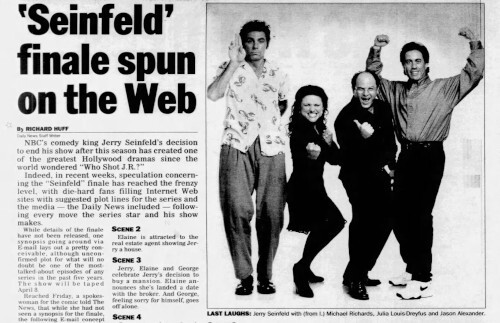There’s been a lot of chatter about the Seinfeld finale in recent months, following Jerry Seinfeld’s cryptic revelation that “something is going to happen” involving the show’s controversial ending. Which, frankly, could have meant anything from a cast reunion in a cringey Super Bowl commercial, to Kenny Bania becoming a playable Fortnite character.
Now it sure seems as though Seinfeld was referring to the final season of Curb Your Enthusiasm, which, not unlike the Seinfeld finale, is putting its protagonist on trial for violating an obscure local law (albeit a conspicuously unjust one designed to suppress Black voters in Georgia).
So Larry David may be using the ending of Curb to revisit a controversy that’s haunted him for decades, which is nuts considering that the Seinfeld finale is actually pretty great. Hey, at the very least it’s better than the fake Seinfeld finale that some folks believed was totally real.
Back in 1998, Seinfeld-mania had reached fever pitch, and the plot line for the finale was tightly guarded. How guarded? After rehearsals, each cast member’s script was shredded to prevent leaks, and Jerry Seinfeld even tried to have them printed with “spylike” ink that could never be copied. This paranoia was totally justified: Jason Alexander recently revealed that he was actually offered a “bribe” through his publicist to leak story details to the press.
Despite the precautions, just two months before the finale was set to air, The New York Daily News published an article outlining the entire plot of one of the most-anticipated hours in the history of television, based off of a script that had been making the rounds on the janky ‘90s version of the internet. The paper cautioned readers: “Warning: if you don’t want to know details of the last episode — real or not — read no further.”
New York Daily News
The article goes on to describe the storyline of the finale, in which Jerry is offered his own “TV variety show” and has to move to Hollywood. Elaine and George accompany their friend to help him pick out a mansion, then decide to stay — Elaine because she hooks up with Jerry’s handsome real estate agent, and George because he randomly lands a job as a TV critic.
They wistfully clean out Jerry’s New York apartment, and say goodbye to Kramer — but then he moves to L.A. too, thanks to an NBC executive who casts Kramer in a sitcom. As Kramer tells Jerry, “NBC has an opening on Thursday night. If I’m not Must-See TV, no one is!” Then, in the final moments of the show, Jerry’s bliss is somewhat upended when he meets his new mail carrier: It’s Newman for some confusing reason.
In retrospect, it’s hilarious just how wildly off-the-mark this hoax script was. The real finale was a gauntlet of existential angst that ultimately punished Jerry and his pals for their years of amoral indifference to humanity. The “leaked” script feels like a coma fantasy in which the Seinfeld gang end up improbably happy and rich beyond their wildest dreams.
Amazingly, this conflict-free story of Jerry ditching New York to become the next Ryan Seacrest actually fooled some people at the time. Fans found it to be “intricately detailed” and “reasonably funny.” Even the head of Castle Rock Television, when clarifying to the press that the script was a fraud, admitted that “somebody’s gone to a lot of trouble.” David was also surprised at the lengths the anonymous author went to, telling reporters: “It’s obviously the result of a mental patient with time on his hands.”
You (yes, you) should follow JM on Twitter (if it still exists by the time you’re reading this).

